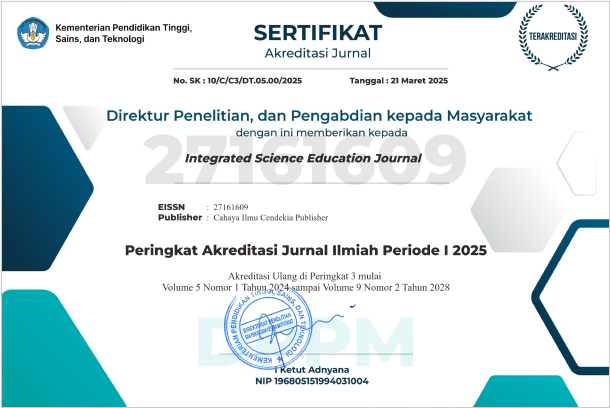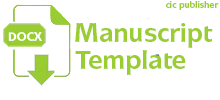Senior High School Students' Multiple Intelligences and their Relationship with Academic Achievement in Science
Abstract
Purpose of the study: This study aims to investigate senior high school students’ multiple intelligences and their academic achievement in science.
Methodology: This study employs a descriptive correlational research design. The respondents of this study were 300 in the 11th Grade of senior high school students. The Multiple Intelligences Inventory is used to assess students' intelligence, while their final grade in science measures academic achievement.
Main Findings: The results of this study showed that senior high school students possess all intelligence to a great extent. Existential intelligence obtained the highest mean score of 3.96, as possessed by the respondents. On the other hand, musical intelligence got the lowest mean score of 3.60. It also showed that all multiple intelligences correlate with academic performance achievement. The correlation analysis showed that all multiple intelligences were statistically significant and could positively predict academic achievement in science.
Novelty/Originality of this study: This present study may give insights to teachers about integrating multiple intelligences in the classroom.
References
H. Gardner, “Intelligence Reframed: Multiple Intelligences for the 21st Century,” NY: Basic Books, 1999.
H. Gardner, “Frames of Mind: The Theory of Multiple Intelligences,” New York: Basic, 1993.
H. Gardner, “Multiple Intelligences: The First Thirty Years,” Harvard Graduate School of Education, 2011.
K. Goodnough, “Multiple Intelligences Theory: A Framework Personalizing Science Curricula,” School Science & Mathematics, 101( 4), 2001.
R. Steinmayr, A. Meißner, A. Weidinger, and L. Wirthwein, “Academic Achievement,” Oxford Bibliographies Online Datasets. DOI: 10.1093/obo/9780199756810-0108, 2015.
B. Spinath, “Academic Achievement,” In Encyclopedia of Human Behavior. 2nd ed. Edited by Vilanayur S. Ramachandran, 1–8. San Diego, CA: Academic Press, 2012.
G. Kaloiya, and S. Basu, “Academic Achievement, Behavioral and Emotional Problem among Marginalized Children,” International Journal of Indian Psychology, Volume 4,(3), DIP: 18.01.085/20170403, 2017.
Department of Education, “PISA 2018: The National Report of the Philippines,” https://www.deped.gov.ph/wpcontent/uploads/2019/12/PISA-2018-Philippine-NationalReport.pdf, 2019.
A. Gürdal, F. Şahin, and Çağlar, “Science Education: Principles, Strategies And Methods,” Istanbul: Marmara University Press, 2001.
N. Fellow, “A Window into Thinking: Using Student Writing to Understand Conceptual Change in Science Learning,” Journal of Research in Science Teaching, 31(9), pp.985-1001, 1994.
M. Baragona, “Multiple Intelligences and Alternative Teaching Strategies: The Effects on Student Academic Achievement, Conceptual Understanding and Attitude,” Unpublished Doctoral Dissertation, University of Mississippi, USA, 2009.
A. Guignon, “Multiple Intelligences: A Theory for Everyone,” Education World, http://www.educationworld.com/a_curr/curr054.shtml, March 2, 2010.
E. Tolentino, “Multiple Intelligences in K to 12 Teaching,” https://www.pressreader.com/philippines/sunstar-pampanga/20170326/281736974282310, 2017.
I. Erkaçan, S. Moğol, and Y. Ünsal, “The Effect of the Multiple Intelligences Theory on Grade 9 Students' Academic Achievement and Retention of Learning About Heat, Temperature, Expansion and Compressibility,” Journal of Turkish Science Education, 9, 65-78, 2012.
A. Abdi, S. Laee, and H. Ahmadyan, “The Effect of Teaching Strategy Based on Multiple Intelligences on Students’ Academic Achievement in Science Course,” Universal Journal of Educational Research, 1, 281-284. 10.13189/ujer.2013.010401, 2013.
O. Gomaa, “The Effect of Differentiating Instruction Using Multiple Intelligences on Achievement in and Attitudes towards Science in Middle School Students with Learning Disabilities,” Psycho-Educational Research Reviews, 3(3), 109 –. Retrieved from https://journals.lapub.co.uk/index.php/perr/article/view/117, 2014.
G. Shahzada, U. Khan, and K. Faqir, “Interrelation of Multiple Intelligences and their Correlation with Students ’ Academic Achievements: A Case Study of Southern Region,” Khyber Pakhtunkhwa, 2015.
G. Baş, “The Effect of Multiple Intelligences Theory-Based Education on Academic Achievement: A Meta-Analytic Review,” Educational Sciences: Theory & Practice, 16. 1833-1864. 10.12738/estp.2016.6.0015, 2016.
C. Koçak, “Context-Based Chemistry Teaching within the 4EX2 Model: Its Impacts on Metacognition, Multiple Intelligence, and Achievement,” Journal of Turkish Science Education, 15, 1-12. 10.12973/tused.10226a, 2018.
T. Armstrong, “Multiple Intelligences in the Classroom,” (2nd Ed.). Alexandria, VA: Association for Supervision and Curriculum Development, 2000.
T. Hoerr, “Becoming A Multiple Intelligences School,” Alexandria, VA: Association for Supervision and Curriculum Development, 2000.
S. Denig, “Multiple Intelligences and Learning Styles: Two Complementary Dimensions,” Teachers College Record, 106(1), 96–111, 2004.
P. Klein, “Multiplying the Problems of Intelligence by Eight: A Critique of Gardner’s Theory,” Canadian Journal of Education, 22(4), 377–394, 1997.
R. Sternberg, “The Nature of Human Intelligence,” Cambridge University Press. https://doi.org/10.1017/9781316817049, 2018.
A. Nurulwahida, A. Yaacob, and S. Shaik-Abdullah, “The Multiple Intelligence-Based Enrichment Module on the Development of Human Potential: Examining Its Impact and the Views of Teachers,” Malaysian Journal of Learning and Instruction, 13 (2), 175-200, 2016.
M. Nishishiba, M. Jones, and M. Kraner, “Research Methods and Statistics for Public and Nonprofit Administrators,” pp. 116-150, 55 City Road, London: SAGE Publications, Inc. doi: 10.4135/9781544307763, 2014.
D. Naoe, “The Multiple Intelligence of Grade V Pupils: Bases for the Proposed Learning Enhancement Program of David Elementary School,” International Scientific Research Journal. ISSN: 20941749 Volume: 2 Issue: 1, 2010.
S. Alrabah, S. Wu, and A. Alotaibi, “The Learning Styles and Multiple Intelligences of EFL College Students in Kuwait,” International Education Studies; Vol. 11, No. 3 doi:10.5539/ies.v11n3p38P, 2018.
D. McFarlane, “Multiple Intelligences: The Most Effective Platform for Global 21st Century Educational and Instructional Methodologies,” College Quarterly, 14(2), 1-8, 2011.
R. Bautista, “The Convergence of Mastery Learning Approach and Self-Regulated Learning Strategy in Teaching Biology,” Journal of Education and Practice, 3(10), 25-32, 2012.
A. Setiawan, “Scientific Literacy Based on Multiple Intelligences and Learning Motivation,” doi: 10.35542/osf.io/83uqt, 2019.
A. Winarti, L. Yuanita, and M. Nur, “The Effectiveness of Multiple Intelligences Based Teaching Strategy in Enhancing the Multiple Intelligences snd Science Process Skills of Junior High School Students,” Journal of Technology and Science Education, 9 (2), 122-135. https://doi.org/10.3926/jotse.404, 2019.
Z. Ozdilek, “To What Extent Do Different Multiple Intelligences Affect Sixth Grade Students' Achievement Level on the Particle Model of Matter?,” Procedia Social and Behavioral Sciences, 2, (2), 4858-4862, 2010.
E. Al-Salameh, “Multiple Intelligences of the High Primary Stage Students,” International Journal of Psychological Studies, 4(1), 196-204. http://dx.doi.org/10.5539/ijps.v4n1p196, 2012.
M. Luis, P. Miria, I. Nieto, A. Otero, and J. Amengual, “Relationships Among Multiple Intelligences, Motor Performance and Academic Achievement in Secondary School Children,” International Journal of Academic Research, 6, (6), 69-76, 2014.
Y. Ahvan, and H. Pour, “The Correlation of Multiple Intelligences for the Achievements of Secondary Students. Educational Research and Reviews, 11, (4), 141-145, DOI: 10.5897/ERR2015.2532, 2016.
Copyright (c) 2023 Mark Gerald B. Doblon

This work is licensed under a Creative Commons Attribution-NonCommercial 4.0 International License.
Authors who publish with this journal agree to the following terms:
- Authors retain copyright and acknowledge that the Integrated Science Education Journal is the first publisher licensed under a Creative Commons Attribution 4.0 International License.
- Authors are able to enter into separate, additional contractual arrangements for the non-exclusive distribution of the journal's published version of the work (e.g., post it to an institutional repository or publish it in a book), with an acknowledgment of its initial publication in this journal.
- Authors are permitted and encouraged to post their work online (e.g., in institutional repositories or on their website) prior to and during the submission process, as it can lead to productive exchanges and earlier and greater citation of published work.







.png)
.png)






